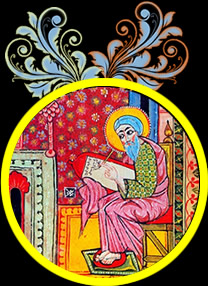Glossary (Senekerim – Sis)
Senekerim
Armenian king of Artsruni dynasty. He ruled in Vaspurakan province. In 1021, when the Seljuk Turks invaded Armenia, King Senekerim surrendered his Kingdom to the Byzantine Emperor Basil II in exchange for Sebastia and Cesaria.
Serebryakov, Lazar
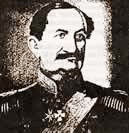 Lazar Serebryakov
Lazar Serebryakov
(1795-1862) Ghazar Artsatagortsian, Admiral of Russian navy. He excelled in Russo-Turkish war of 1828-1829.
Serob
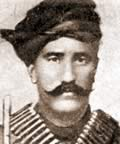 Serob Aghpiur
Serob Aghpiur
(1864-1899) Serob Vardanian, also called Aghpiur (Spring, Source), and Serob-Pasha, legendary fedayi famous for his courage. He was member of Dashnaktsutiun party. After many successful combats against the Turkish regular troops, he was poisoned in 1988.
Sevak (Paruyr Sevak)
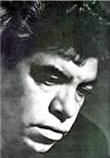 Paruyr Sevak(1924-1971) Paruyr Ghazaryan, Soviet Armenian poet. His major work Unsilenceable Belfry (1958) is dedicated to Comitas. He was tragically killed in an automobile accident.
Paruyr Sevak(1924-1971) Paruyr Ghazaryan, Soviet Armenian poet. His major work Unsilenceable Belfry (1958) is dedicated to Comitas. He was tragically killed in an automobile accident.
Sevak, Ruben
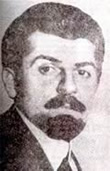 Ruben Sevak
Ruben Sevak
(1885-1915) Western Armenian poet and prose writer, native of Silivri near Constantinople. Among many other intellectuals, he was arrested on April 24, 1915 and killed on August 26, 1915.
Shabin-Karahisar
Formerly Koghonia, village in the Western Armenia (present-day northeastern Turkey). General Andranik was born there. In 1915, during the Armenian Genocide in the Ottoman Empire, the inhabitants of Shabin-Karahisar offered a desperate resistance to the Ottoman regular army. Turkish assaults lasted more than a month, until the last defender of the village was killed.
Shaginyan, Marietta
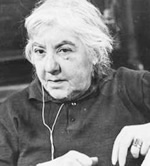 Marietta Shaginyan
Marietta Shaginyan
(1888-1982) Soviet Armenian writer and publicist. She translated into Russian the works of Hovannes Tumanian. She authored the novels Mess-Mend (1922), Three Looms (1929), Hydrocentral (1930–31), memoirs and encyclopedical works.
Shahumian region
Formerly: Gulistan; in 1930 was renamed in honor of Stephan Shahumian. Situated in the north of Nagorno-Karabakh Republic, Gulistan historically was part of Gulistan principality of Artsakh, governed by the Melik Beghlarian family. The Treaty of Gulistan was signed here in 1813. In 1921, Gulistan with the rest of Karabakh was forcibly attached to Azerbaijan. However, Gulistan was not included into the “Autonomous Region of Nagorno-Karabakh” formed in 1923.
After Azerbaijan declared independence in August 1991, the joint sitting of the Nagorno-Karabakh and Shahumian deputies proclaimed an independent Nagorno-Karabakh Republic (comprising the former autonomous region of Nagorno-Karabakh and the Shahumian region). The independence of the NKR was officially asserted in a referendum held on December 10, 1991. The Shahumian region became scene of military operations since 1990. The region is presently under the Azeri occupation.
Shahumian, Stepan
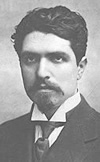 Stepan Shahumian
Stepan Shahumian
(1878-1918) Armenian Bolshevik, writer and editor. He organized the Baku Commune and headed the resistance to the Turkish forces. After the British occupation of Baku in 1918, Shahumian and other Commissars escaped to Krasnovodsk, but were arrested and executed by British-allied.
Shant, Levon
 Levon Shant
Levon Shant
(1869-1951) Levon Seghposian, Armenian poet, novelist and playwright, founder of National Cultural Foundation.
Shiraz, Hovannes
(1915-1984) Hovannes (Onik) Karapetyan, Armenian popular lyric poet. Most of his poems are about love and the homeland, especially about Mount Ararat.
Shushi
Historical center of Artsakh (Karabakh) situated on a mountain plateau (1400m), 10 km from Stepanakert. Initially an inaccessible fortress, Shushi became city in the middle of the 19th century. Its rapid growth made it an important Armenian center. The population of Shushi was 60,000 in 1920, of which Armenians made up 47,000.
In March 1920, during the Turkish aggression the Armenian part of Shushi was burned to the ground; 30,000 Armenians out of 47,000 were killed. The Soviet-Azeri rule marked the rapid azerbanization of the city.
From the beginning of the military conflict in 1991, the Azeri forces made use of the strategic geographical location of Shushi utilizing its commanding heights for the mass bombing of Stepanakert and its outskirts. On May 9, 1992 Shushi was liberated by the Karabakh defense forces.
Siamanto
 Siamanto
Siamanto
(1878-1915) Atom Yarjanian, Armenian poet. In his works, he reflected the massacres of Sultan Abd-Al Hamid. He was the first Armenian poet to use free verse. He was arrested, among many others, on April 24, 1915 and then killed in August.
Siunik
Province of the Greater Armenia, one of 15 ashkhars (worlds). Siunik consisted of 12 cantons: Arevik, Kovsakan, Dzork, Baghk, Tsghuk, Haband, Erindjak, Tchahouk, Aghahejk, Vayotz Dzor, Guegharkunik and Sodk.
Sis
Capital of the Cilician Armenian Kingdom (1198-1375). Before the 12th century, Sis was an insignificant fortress. From the seventies of the 12th century Sis developed rapidly. Leon II made it his capital.


